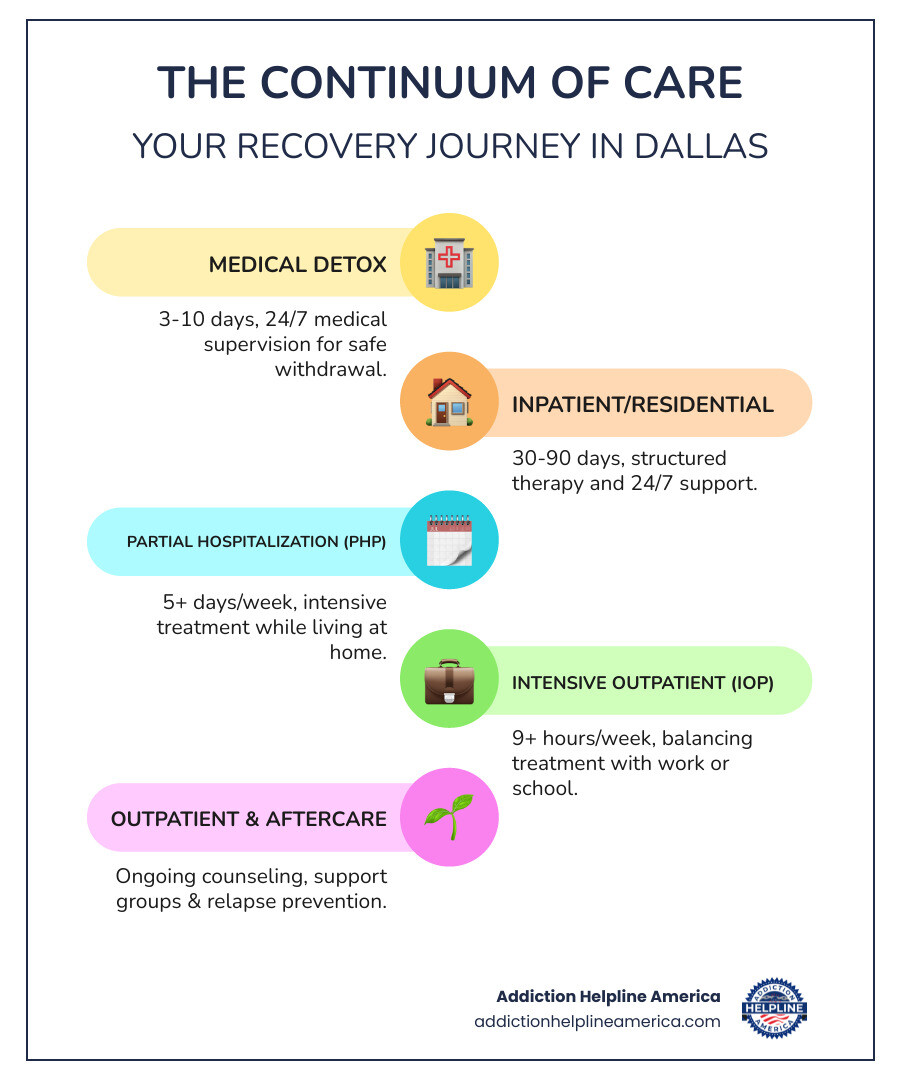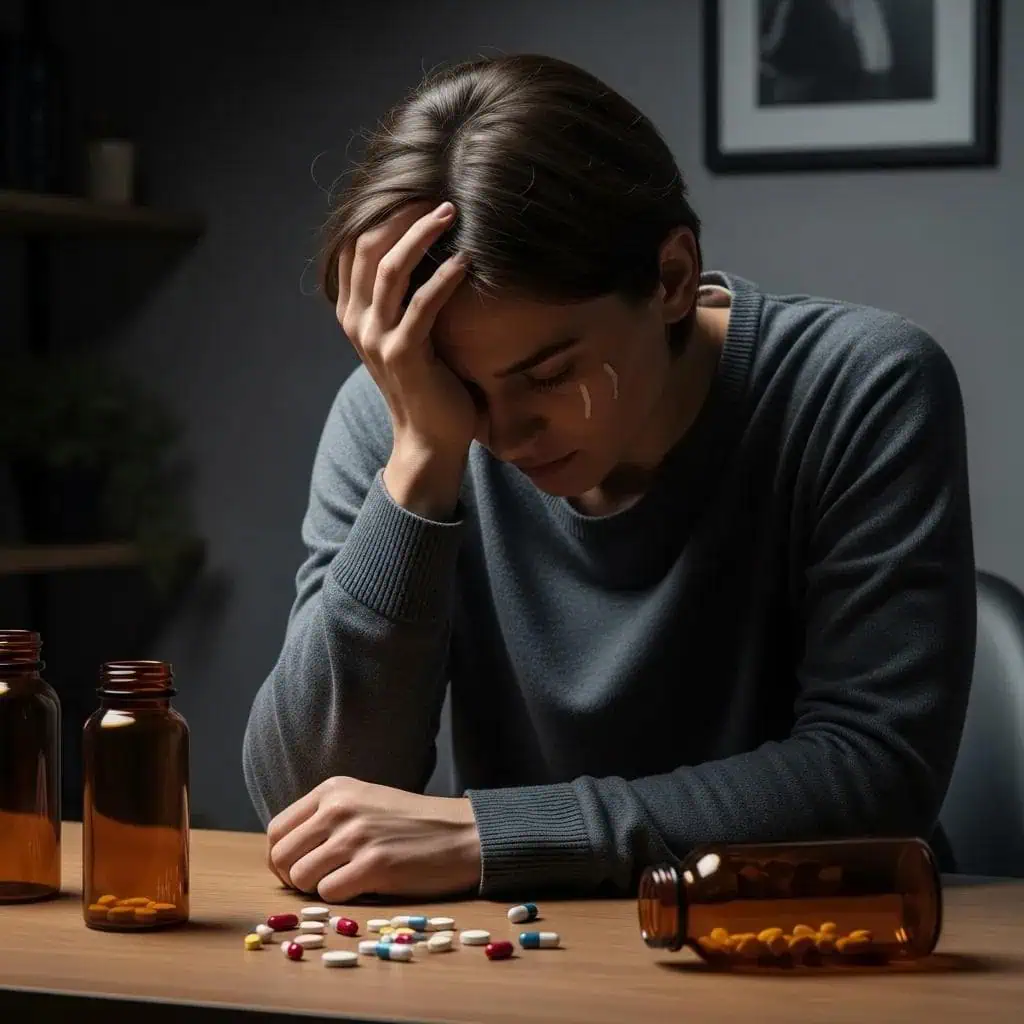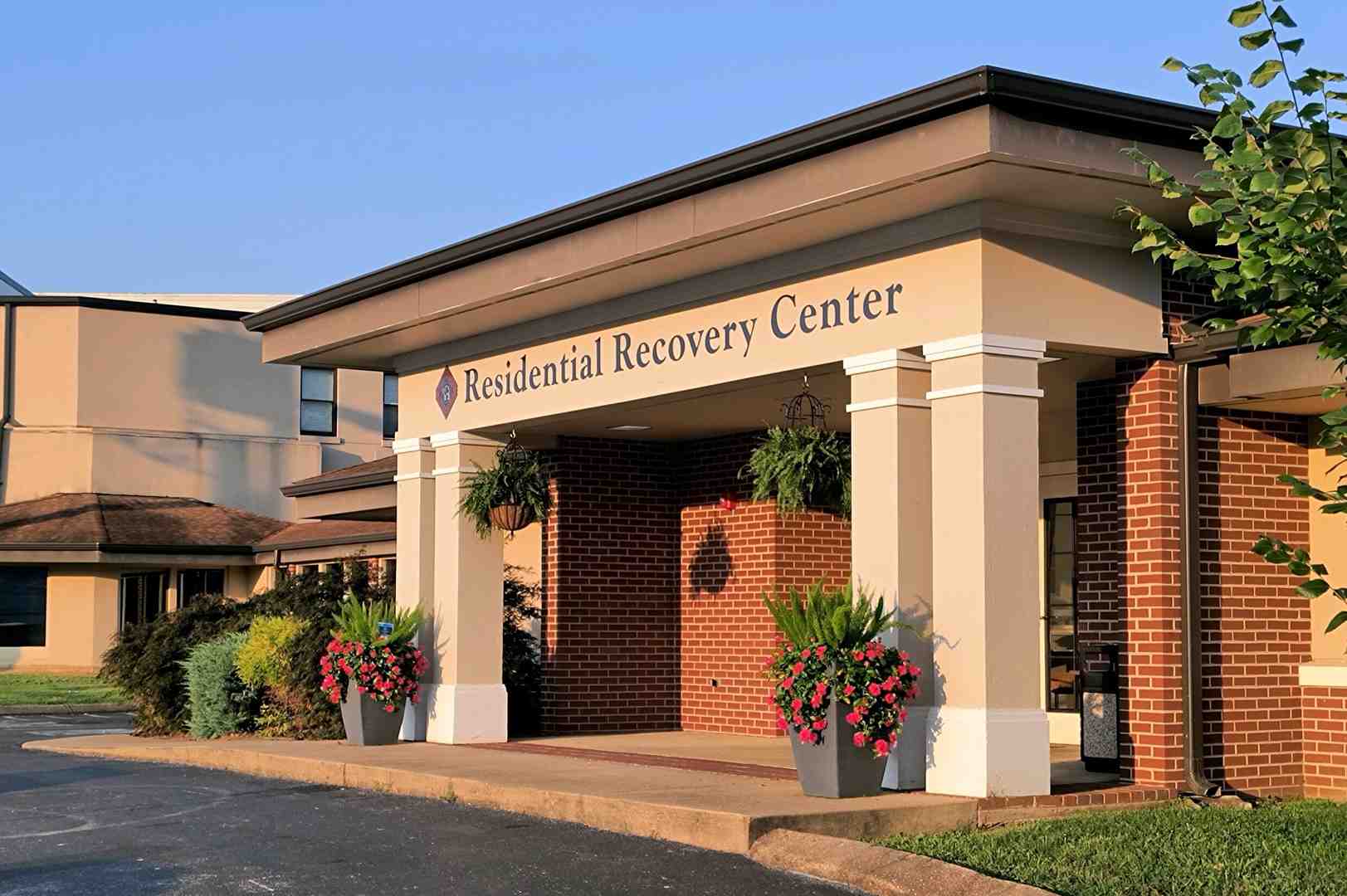
Understanding Drug Rehab Centers in Dallas, Texas
Drug rehab centers in Dallas, Texas provide a lifeline for individuals struggling with substance use disorders. They offer a full continuum of care—from medical detox and inpatient programs to outpatient therapy and aftercare—to treat addiction to substances like alcohol, opioids, and methamphetamines. Many facilities also address co-occurring mental health conditions such as depression, anxiety, and trauma.
Quick Guide to Dallas Rehab Options:
| Treatment Type | What It Offers | Best For |
|---|---|---|
| Medical Detox | 24/7 medical care during withdrawal | Safe withdrawal from alcohol, opioids, benzodiazepines |
| Inpatient/Residential | 24/7 structured care in a facility (30-90 days) | Severe addiction, unstable home environment |
| Partial Hospitalization (PHP) | Intensive daily treatment while living at home | A step-down from inpatient or for intensive needs |
| Intensive Outpatient (IOP) | Several hours of therapy per week | Balancing treatment with work or school |
| Outpatient & Aftercare | Ongoing counseling and support groups | Long-term recovery maintenance |
The need for these services in Dallas is urgent. The county has been hit hard by the substance abuse crisis, with fentanyl-related deaths increasing by 400% between 2019 and 2020. However, recovery is happening every day. Dallas treatment centers report significant improvements in clients’ mental health, including a 66.7% decrease in depression and a 54.3% decrease in anxiety after just 30 days.
Choosing the right facility is the most important first step. Key factors to consider include accreditation, treatment approaches, levels of care offered, specialized programs, and payment options.
At Addiction Helpline America, we help you steer these choices. Our team is available 24/7 to connect you with confidential, personalized treatment options for drug rehab centers in Dallas, Texas.
Find more about drug rehab centers in dallas texas:
- how much are drug rehab centers
- comprehensive rehab programs
- what drug rehab centers accept medicaid
The Alarming Reality of Substance Use in Dallas
Dallas is a vibrant city, but it’s also at the center of a serious substance abuse crisis. The statistics highlight why accessible drug rehab centers in Dallas, Texas are essential for the community’s health and safety.
- Overdose Deaths: Between 2017 and 2019, Dallas County lost 13 people per 100,000 to drug overdose deaths.
- The Fentanyl Crisis: This synthetic opioid, up to 50 times stronger than heroin, has had a devastating impact. In Dallas, fentanyl-related deaths surged by 400% between 2019 and 2020. It is often mixed into other drugs without the user’s knowledge, making any use a deadly risk.
- Alcohol Abuse: About 18% of Dallas adults reported binge drinking in the past month. This contributes to the region having the highest rate of arrests for drunkenness in 2020, at 153.1 per 100,000 citizens.
- Widespread Issue: An estimated 400,000 people in the Dallas-Fort Worth metro area had a substance use disorder between 2010 and 2015, showing the broad scope of the problem.
These numbers represent a call to action, and Texas has responded with laws designed to save lives.
The Jessica Sosa Act, or the 911 Good Samaritan Law, provides legal protection from prosecution for drug possession to those who call for help during an overdose. This law prioritizes saving a life over making an arrest.
Additionally, the state’s Naloxone Access Law allows anyone to get the opioid-overdose-reversing drug Naloxone (Narcan) from many pharmacies without a prescription. Having this on hand can be the difference between life and death.
These laws and the robust network of treatment centers in Dallas offer hope. Addiction is a treatable health crisis, and the right help is available. If you or a loved one is struggling, Addiction Helpline America can confidentially guide you to the right program at no cost to you.
Top 5 Drug Rehab Centers in Dallas, Texas
Finding the right treatment center is a critical decision. Dallas offers a wide variety of options to fit different needs and budgets. Here are five top drug rehab centers in Dallas, Texas that showcase the range of care available.
1. Addiction Helpline America Partner Center: Dallas Recovery Solutions
Our partner center, Dallas Recovery Solutions, is distinguished by its proven results. Their 60-day readmission rate for relapse is just 10%—making their success rate 76% better than the industry average of 22%. Clients also see dramatic mental health improvements in just 30 days, including a 66.7% decrease in depression and a 54.3% decrease in anxiety.
They stand by their program with a treatment guarantee: if you complete 60 days of care and relapse, you can return for another 60 days at no cost. The center provides comprehensive dual diagnosis care to treat addiction and co-occurring mental health conditions simultaneously. Their approach blends evidence-based therapies with holistic options like yoga, equine-assisted therapy, and bio-sound beds.
Accredited by The Joint Commission and designated as a Blue Distinction Center, Dallas Recovery Solutions meets the highest standards for quality and safety. To learn more, please Contact Us 24/7.
2. Dallas Wellness Recovery Center
This center provides an upscale, serene environment for healing, complete with comfortable amenities. It offers medical detox services for a safe, supervised withdrawal. A key feature is their personalized care plans, which are custom to each individual’s unique story and recovery goals. They also provide specialized support for veterans and first responders, using trauma-informed care to address the root causes of addiction. Dallas Wellness Recovery Center accepts most private insurance plans, making high-quality care more accessible.
3. Hope Renewed Recovery Center
As a non-profit, Hope Renewed focuses on people over profits, with a strong emphasis on family involvement in the recovery process. They offer a vital service with specialized care for pregnant and parenting individuals, including on-site childcare support. This removes a major barrier for mothers seeking treatment. Offering both residential and outpatient programs, they are committed to serving diverse populations and making care affordable by accepting Medicaid and offering sliding scale fees.
4. New Horizons Recovery Network
New Horizons takes a holistic wellness approach that integrates mind, body, and spirit, using mindfulness-based programs to teach healthy coping skills. They are known for their flexible outpatient (IOP) options, including virtual sessions, which allow clients to balance treatment with work or family life. The network also provides sober living support to help people transition safely back to independent living. They are committed to removing barriers to treatment and offer multilingual services, including Spanish-speaking staff.
5. Dallas Community Recovery House
This facility demonstrates that community and support are powerful healing tools. It provides free and low-cost services through a peer-led model focused on peer recovery support. They offer a social detox program for less severe cases and host a variety of 12-Step and alternative support groups (like AA and NA). As a community-funded organization, Dallas Community Recovery House offers both short-term and long-term support to those who might otherwise have nowhere to turn, with strong alumni programs to ensure lasting connection.
How to Choose the Right Rehab Program in Dallas
Choosing the right program from the many drug rehab centers in Dallas, Texas is crucial for lasting recovery. Understanding the different levels of care and treatment methods will help you make an informed decision.
Types of Treatment Programs
Recovery is a journey, and most people move through different levels of care as they heal.
- Medical Detoxification: This is often the first step, providing 24/7 medical supervision to manage withdrawal symptoms safely. It typically lasts 3 to 10 days. An overview of the process can be found in this guide to detoxification.
- Inpatient/Residential Care: This involves living at a facility for 30, 60, or 90 days to focus entirely on recovery in a structured, trigger-free environment.
- Partial Hospitalization Programs (PHP): A step down from inpatient care, PHP offers intensive treatment during the day while you live at home or in a sober living environment.
- Intensive Outpatient Programs (IOP): IOP provides flexibility, with therapy sessions for nine or more hours per week, allowing you to maintain work, school, or family commitments.
- Sober Living Homes: These are structured, substance-free residences that bridge the gap between intensive treatment and independent living, offering peer support and accountability.
- Aftercare Planning: A critical component of any good program, aftercare creates a plan for ongoing support through therapy, support groups, and alumni programs to prevent relapse.
Key Treatment Approaches
Effective rehabs use a combination of proven methods custom to your needs.
- Evidence-Based Therapies: These are the foundation of quality treatment. Cognitive Behavioral Therapy (CBT) helps change negative thought patterns linked to substance use, while Dialectical Behavior Therapy (DBT) teaches skills for managing intense emotions and stress.
- Dual Diagnosis Care: Since over half of people with a substance use disorder also have a mental health condition (like depression or anxiety), dual diagnosis care is essential. It treats both issues simultaneously for a better chance at lasting recovery.
- Medication-Assisted Treatment (MAT): For opioid or alcohol addiction, MAT combines FDA-approved medications (like Suboxone or Antabuse) with counseling. This approach is proven to reduce cravings and prevent relapse.
- Holistic Therapies: Many centers incorporate therapies like yoga, art therapy, and mindfulness to heal the whole person—mind, body, and spirit.
Paying for Drug Rehab Centers in Dallas, Texas
Cost should not be a barrier to getting help. There are many ways to pay for treatment.
- Private Health Insurance: Most drug rehab centers in Dallas, Texas accept private insurance from providers like Aetna, Blue Cross Blue Shield, Cigna, and others. The Mental Health Parity and Addiction Equity Act ensures that coverage for addiction treatment is comparable to that for physical health. Our team can help you verify your insurance coverage and understand your benefits.
- Medicaid and Medicare: For those with lower incomes or specific health needs, 30 rehabs in Dallas accept Medicaid and 21 accept Medicare.
- State-Funded Programs: Texas offers low-cost or free treatment for residents who qualify through its OSAR (Outreach, Screening, Assessment, and Referral) system.
- Sliding Scale Fees & Free Options: Nearly half of Texas facilities offer sliding scale fees based on income. In addition, non-profits and community-funded programs provide genuinely free services.
At Addiction Helpline America, we can help you explore all these options to find a program that fits your financial situation.
The Path to Recovery: From Admission to Aftercare
Starting on the path to recovery is a brave and life-changing decision. It takes courage to admit you need help, and even more courage to take that first step. Understanding the process—from recognizing the signs that help is needed to navigating admission and planning for life after rehab—can make the journey feel less overwhelming and more manageable.
Signs You or a Loved One May Need Help
Addiction often develops gradually. If you’re wondering whether it’s time to seek help from drug rehab centers in Dallas, Texas, watch for these common signs:
- Loss of control over substance use (using more than intended or being unable to stop).
- Withdrawal symptoms (nausea, anxiety, tremors) when trying to quit.
- Neglecting responsibilities at work, school, or home.
- Relationship problems stemming from substance use.
- Continued use despite negative consequences (legal, health, or social).
- Deteriorating physical or mental health.
If these signs are familiar, know that addiction is a treatable medical condition, and help is available.
The Admissions Process for Drug Rehab Centers in Dallas, Texas
Entering treatment is a supportive and straightforward process. At Addiction Helpline America, we guide you through every step.
- Confidential Assessment: We start with a judgment-free conversation to understand your situation, what substances are involved, and your treatment goals. This helps determine the right level of care.
- Insurance Verification: Our team works with your insurance provider to verify your coverage and explain any potential out-of-pocket costs, removing financial guesswork.
- Personalized Treatment Plan: We help create a plan with the specific therapies and services that best match your needs.
- Logistics and Travel: We can help coordinate travel and transportation to the facility, ensuring a smooth arrival.
When packing, you’ll generally need comfortable clothes, alcohol-free toiletries, prescription medications, and identification. It’s best to leave electronics, valuables, and any prohibited items at home to minimize distractions and focus on healing.
Life After Rehab: The Importance of Ongoing Support
Completing a rehab program is a huge accomplishment, but it’s the beginning of a lifelong recovery journey. Strong aftercare is key to maintaining sobriety.
- Alumni Programs: Stay connected to a supportive network of peers who understand your journey.
- Community Support Groups: Groups like Dallas AA meetings and Dallas Area NA meetings offer vital peer support. For families, Texas Al-Anon/Ala-teen provides education and encouragement.
- Sober Living Environments: These substance-free homes offer a structured transition from rehab back to independent life, providing accountability and peer support.
- Continued Therapy: Ongoing individual or group therapy helps you manage challenges and strengthen your coping skills.
- Relapse Prevention: A solid aftercare plan equips you with strategies to identify triggers, manage cravings, and steer high-risk situations.
Recovery is about progress, not perfection. A strong support system makes the journey manageable and successful.
Frequently Asked Questions about Dallas Rehab Centers
When you’re considering treatment, it’s natural to have questions—lots of them. We’ve been helping people steer drug rehab centers in Dallas, Texas for years, and these are the questions we hear most often. Let’s walk through them together.
How long does rehab in Dallas typically last?
The length of treatment is personalized and depends on your specific needs, the substances used, and the presence of any co-occurring conditions. There is no one-size-fits-all timeline, but here are some general guidelines:
- Detox: Usually lasts 3 to 10 days.
- Inpatient/Residential Treatment: Commonly offered in 30, 60, or 90-day programs.
- Outpatient Programs (PHP/IOP): Can range from several weeks to many months, offering flexibility to fit your life.
The goal is not to meet a deadline but to build a strong foundation for lasting sobriety.
Can I lose my job for attending rehab in Texas?
No, you are legally protected. The Family and Medical Leave Act (FMLA) allows eligible employees to take unpaid, job-protected leave for medical reasons, including addiction treatment. Additionally, the Americans with Disabilities Act (ADA) protects individuals in recovery from workplace discrimination.
Your treatment is also confidential under HIPAA. While you will need to arrange leave with your employer, you can focus on your recovery knowing your job is secure.
Are there free drug rehab options in Dallas, TX?
Yes, absolutely! We believe this deeply: money should never stand between you and recovery. If you’re worried about cost, please know that Dallas has several pathways to free or very low-cost treatment.
- Non-Profit & Community Programs: Many organizations, funded by grants and donations, offer services at no charge.
- State-Funded Facilities: Texas provides treatment for residents who meet certain income and residency requirements.
- Texas OSAR Programs: This state system offers free screenings and referrals to publicly funded treatment resources.
If you’re worried about cost, contact Addiction Helpline America. We can help you explore all available options to find care that fits your budget.
Take the First Step Towards a New Life
Recovery is a journey of healing and hope that unfolds one day at a time. By seeking information, you’ve already taken the courageous first step toward change.
Drug rehab centers in Dallas, Texas, offer a full spectrum of care, from medical detox to long-term aftercare. Whether you need an intensive residential program or flexible outpatient support, resources are available to meet you where you are—regardless of your financial situation.
You are not alone in this struggle. Thousands in Dallas share this experience, and many find their way to lasting recovery.
Figuring out the next steps can feel overwhelming, but you don’t have to do it by yourself. Addiction Helpline America exists to provide free, confidential guidance. Our compassionate specialists are available 24/7 to listen to your story, help you understand your options, verify insurance, and connect you with the right program.
A new life, free from addiction, is possible. Let us help you find your path.
Our helpline is 100%
free & confidential
If you or someone you care about is struggling with drug or alcohol addiction, we can help you explore your recovery options. Don’t face this challenge alone—seek support from us.
Programs
Resources
Will my insurance
cover addiction
treatment?
We're ready to help
Find the best
drug or alcohol treatment
center
Are you or a loved one struggling with addiction? Call today to speak to a treatment expert.














